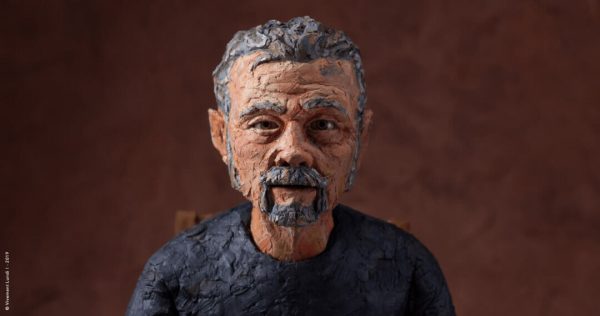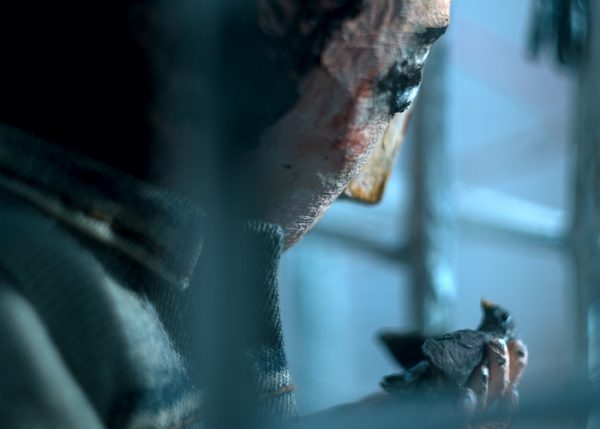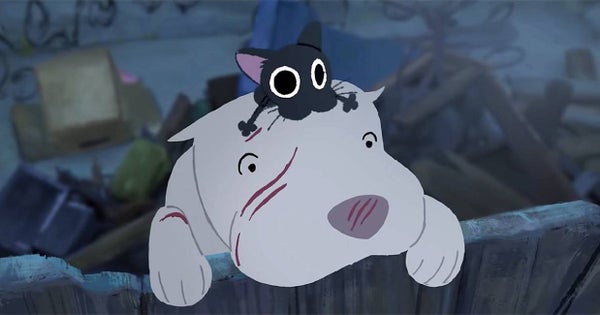Film Review: 2020 Oscar Animated Shorts — Sadness and Beauty
By Peg Aloi
Among this group of strong animated shorts I found the French selection, Mémorable, to be the most powerful and artful.

A scene from the French animated film Mémorable.
This year’s crop of animated shorts nominated for the Academy Award are uniformly excellent and, frankly, rather depressing to watch. Maybe it’s because we’re all feeling a bit world-weary these days. Still, I was deeply moved by their artistry and emotion. In addition to the five nominated pieces, several short films are included in the program that received commendations: honorable mentions, as it were. Stick around for them; they’re a good deal more lighthearted than the first five. They are screening at the Institute of Contemporary Art Boston on February 9, at Coolidge Corner Theatre through February 6, and at Kendall Square Cinema, through February 6.

A scene from the animated film Daughter.
Daughter opens the slate, a Czech Republic student film by Daria Kashcheeva. Created through stop-motion with papier-mâché puppets, the film is a wordless, nearly silent tale of a woman’s relationship with her dying father. It focuses on a childhood memory that helps them reconcile their separation. Daughter is remarkably cinematic, using handheld-camera motion (no small feat in stop-motion filming) to evoke an eerie sense of reality — despite the fact that the figures have bumpy paint-covered faces. The simplicity of emotion on display here is heart-shattering; it serves as an apt preparation for the intense films that follow.
Hair Love is less poignant than Daughter, but also deals with a deeply challenging situation. At its center is a young girl whose dad must take over mom’s “job” of braiding his daughter’s hair while she is receiving cancer treatments. The film has attracted social media attention recently: director Matthew A. Cherry invited to the Oscar ceremony a student whose Texas high school told him he couldn’t attend his graduation unless he cut off his dreadlocks. In addition to its celebration of African-American culture and portrait of a father-daughter bond, Hair Love looks at the demands of parenting and what we can do to make kids feel normal in the midst of difficulty.

A scene from the Pixar animation Kitbull.
The third film is a Pixar short called Kitbull, the story of a scrappy feral kitten who fears, then befriends, a pitbull living near her outdoor shelter. Rosana Sullivan’s film has the look of a ’60s-era cartoon at times, which underscores its timeless message of compassion. The kitten’s antics are adorable and funny, while the pitbull, whose owner uses it for fighting, is mired in sadness. But the gradual journey toward mutual trust is uplifting. I found myself wishing the film had gone a bit further with its message of humans helping rescue animals from abuse, maybe even suggesting that viewers help the many organizations that do this work. So, you should go do that.
Among this group of strong shorts I found the French selection, Mémorable, to be the most powerful and artful. Bruno Collet’s story of a middle-aged painter who is suffering from dementia, and his wife who weathers the journey with him, is compelling and beautiful. Louis still paints, but has trouble recognizing everyday objects and remembering common words. The story is based on American painter William Utermohlen, who continued to paint for over a decade after being diagnosed with Alzheimer’s disease. As Louis’s condition deteriorates, his painting style becomes increasingly abstract and surreal — as does the film. Louis and his wife are portrayed with figures coated with paint, thickly textured and multihued. Their look becomes a sort of metaphor for being “all there,” a transformation into, and out of, a more elemental state of being. The film was done in stop-motion, though it also used a bit of digital animation. I was mesmerized and haunted by this one.
Sister, made by Chinese American filmmaker Siqi Song, is a meditation on the imaginary sister Song never had because of China’s one child policy. The figures in this charming but also intensely melancholy stop-motion film are made from wool yarn and fabric, which gives Sister a textural look that suggests the mutability of memory and fantasy. Despite its sad and sober theme, Sister is also a rather sweet story that celebrates an adult’s capacity for childlike imagination and wonder.
Peg Aloi is a former film critic for The Boston Phoenix and member of the Boston Society of Film Critics. She taught film studies in Boston for over a decade. She writes on film, TV, and culture for web publications like Vice, Polygon, Bustle, Mic, The Orlando Weekly, Crooked Marquee, and Bloody Disgusting. Her blog “The Witching Hour” can be found at themediawitch.com.
